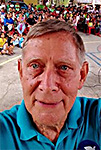RPCV Response Volunteer Killed in Philippines
The Peace Corps mourns the loss of Alan Hale
 WASHINGTON – Peace Corps Response Volunteer Alan Hale, 80, of Bellingham, Wash., died in a bicycling accident in his site in the Philippines on July 11.
WASHINGTON – Peace Corps Response Volunteer Alan Hale, 80, of Bellingham, Wash., died in a bicycling accident in his site in the Philippines on July 11.
Hale arrived in Southern Leyte province in October 2018 and worked with local officials to improve solid waste management. He delivered training to more than 2,000 people with a focus on eliminating trash burning and littering.
Hale was on his second tour as a Peace Corps Response Volunteer Peace Corps as a training officer with Anita Hale in Puerto Rico for three years in the 1960s.
A longtime resident of Bellefontaine, Ohio, Hale was a life member of Kiwanis International and a member of Toastmasters International. He volunteered on many boards, including the Logan County Art League. He was also an avid swimmer who had a great appreciation for nature.
After graduating from Euclid High School in Euclid, Ohio, Hale studied biology as an undergraduate at Dartmouth College. He went on to earn a master’s degree in education at Mankato State University in Minnesota and a law degree at Ohio Northern University.
Hale had successful careers as an attorney, teacher, outdoor experiential leader, and municipal solid waste manager. His understanding of recycling and waste management, along with his desire to improve the environment, led him to become a Peace Corps Response Volunteer.
“I joined the Peace Corps to fulfill a 50-year dream of serving as a Peace Corps Volunteer,” Hale wrote from his site. “My service in the Philippines means I have not been a porch-sitting retiree, but an active citizen involved in meaningful work.”
Very sad, condolences to family and friends. Thanks to Alan Hale for his service!! May he rest in peace!
Well said, and echoed here.
Joanne
DEFINE SACRIFICE
When, say, in an airport an American soldier walks by and a citizen thanks him for his service, I want to ask: what exactly has the soldier done, what were his sacrifices, and would he have the courage to say no should the President decide it’s time to fight another dirty war.
By definition, all wars are ugly, leave scars that last for generations, and rarely solve the problem they were meant to mend. The only certainty: there will be innocent victims. When the bombs stop falling, rifles set down, and the newspapers change titillating headlines, that’s when the real suffering starts. Few will care and the seeds of the next war sprout.
I was reminded of this again when I learned of John Hale’s death this month in the Philippians. He wasn’t killed by a terrorist’s bullet but rather the poverty that made his work dangerous. He was killed in a bicycle accident. He had taught over 2,000 people better waste management skills. Not sexy enough for you? How about this: he was on his third tour and 80 years old.
Peace Corps volunteers deserve the same respect as our soldiers and maybe more. They change the world through dialogue and good deeds. Are their lives in danger? Of course. Disease stalks, politics interfere, and accidents happen. The day before I arrived for my service in Peru, an earthquake struck, and two female volunteers were crushed to death, found in each other’s arms.
Thank you, John Hale, for your service. You are why I am proud to be an American. You made the world a better place and our nation proud.
I suspect that you have never served in the armed forces or you would remember the oath to “obey the orders of the President of the United States and the officers” assigned. In the event of war, disobedience could be interpreted under 899 Article 99 of the Uniform Code of Military Justice as cowardice in the face of the enemy for which the punishment can be death.
Mr. Lihosit: Thanks for the precise clarification. My point remains valid. it would take incredible courage to refuse to fight in an unjust war. Would I have that kind of courage? I don’t know. In my youth, I made sure I was not fighting in a war that was definitely killing innocent civilians. I served my country without harming others. Since history proves that most wars were unnecessary and create more problems than they solve, the question remains: what should soldiers and civilians do when the President calls for violent solutions? Most soldiers are honorable men; few wars are.
If Peace Corps studied peace with the same dedication the military studies war, we would have a more effective Peace Corps.
Mr. Lihosit? You just made me feel as old as my Santa Claus beard! Instead of shouting, “could-of, would-of, should-of” it behooves us all to scream for a repeal of the Patriot Act which instituted perpetual war and a police state. Why are no candidates even mentioning this?
Good point, young fellow, who can talk seriously but also with a smile. You cut to the core and I have no answer. How do we get people to care about repealing the Patriot Act?
We start by writing to our Congressmen and women, Senators and even the President. This is really a non-partisan subject. Peaceful demonstrations supporting repeal (especially in D.C.) could be helpful. Questioning candidates about their position on this for the upcoming election would be positive. Writing opinion pieces for our local newspapers also would get people talking, as well as books, radio talk shows, etc..